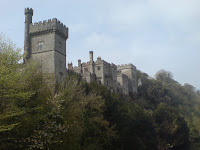I have a fascination with Vita Sackville-West. I think she kept turning up in portraits and books when I was at an impressionable age and somehow I’ve never got over her. It’s not the Virginia Woolf connection that attracts me, and I can’t honestly say I find Vita much of a writer, not fiction at any rate – her gardening articles are something else entirely. I love Sissinghurst but upper class English lady gardeners are hardly unique. Vita’s legacy to me is the variety of her experience; I imagine she must have been a desperately selfish woman in many ways but also passionate, grand, disappointed and above all complicated - impossible to pigeon hole – she would definitely be at my fantasy dinner party.
Broderie Anglaise is a book I bought out of vague curiosity a few months back because of the Vita connection and because I had seen it mentioned a few times and it was at the front of my mind. I picked it up to read this week because it’s short, so perfect to get through in lunch breaks. I tried to read ‘Pirates at Play’ a few years ago and found it very unappealing so thought ‘Broderie Anglaise’ would be a similar chore, it was an unexpected surprise to enjoy it as much as I did.
It is apparently a fictionalised account of the aftermath of Violet and Vita’s affair – and a meeting between Violet and Virginia Woolf, all told from the point of view of her caricature of Virginia – Alexa Harrowby Quince, and very much a reply to ‘Orlando’ which is referenced. I still think that Violet Trefusis is a decidedly second rate writer but here at least she’s very compelling. It’s possibly because she’s getting to have her say – the last word on a very public affair, and a certain amount of revenge through some fairly malicious characterisations. ‘Broderie Anglaise’ was written in French (in 1935) and presumably only published in France, Victoria Glendinning (Vita’s biographer) who writes the introduction thinks it unlikely that either Vita or Virginia new the book, she also points out that Violet would be unlikely to want any of her (still living) victims to read the book, especially Vita’s mother Lady Sackville who gets a pasting.
The plot such as it is has centres around the young Lord Shorne (Vita) and the older but inexperienced Alexa’s (Virginia) affair overshadowed as it is by Shorne’s previous affair with his cousin Anne (Violet) and his morbid fear of his mother and the extraordinary domination she has over him. The initial pen portrait of Alexa is certainly recognisable as Virginia, although a Virginia stripped of any charm. It’s unkind but not entirely unsympathetic, Vita and her mother are treated with real cruelty and disdain; Lord Shorne is shown to be a coward and a liar, his mother a virtual demon, and as with anything to do with Vita, Knole (Otterways) features largely; in this case as another unhealthy obsession.
Bits of it work. The relationship between mother and son is unsettling, grotesque, and just feasible; the relationships between Alexa, Anne and Lord Shorne are imaginable but turning Vita into a man is an over simplification. However bitter Violet felt about the end of their relationship the fact remains that they were both married women, Vita with children. Whilst Lord Shorne has nothing to fear but his (admittedly terrifying) mother his behaviour towards Anne is cowardly and unforgivable, as is his behaviour towards Alexa. For the real Vita – unable as a woman to inherit as the fictional Shorne does, dependant on her mother and her writing for an income, the decision to return to the husband she undoubtedly had a loving if unorthodox relationship with (and of course her children, home and other responsibilities) is altogether less cowardly.
The very best part of the book though is the grand seduction scene – as with all half planned seductions, this one set to take place in the most theatrical of locations there is more than a hint of farce. In this case it’s the drunken progress through a series of state rooms to a moth ball infested four poster. Entirely English, very funny, not particularly salacious, and I suspect very cruel because it has an entirely authentic ring to it.
 There are other passages I’ve marked too, an acid aside about the Italian spring which I’m inclined to see as a sniffy dismissal of ‘The Enchanted April’ is just one. Quite apart from any associations with actual personalities I consider this worth a read – just for the bedroom farce alone it’s worth the cover price, and there’s much more than that, but for anyone with a passing interest in any of the three women it concerns it’s absolutely worth tracking down. If nothing else Violet does a cracking job on demystifying Virginia Woolf and raises some interesting questions about gender and same sex relationships – mostly by not mentioning them.
There are other passages I’ve marked too, an acid aside about the Italian spring which I’m inclined to see as a sniffy dismissal of ‘The Enchanted April’ is just one. Quite apart from any associations with actual personalities I consider this worth a read – just for the bedroom farce alone it’s worth the cover price, and there’s much more than that, but for anyone with a passing interest in any of the three women it concerns it’s absolutely worth tracking down. If nothing else Violet does a cracking job on demystifying Virginia Woolf and raises some interesting questions about gender and same sex relationships – mostly by not mentioning them. 
































